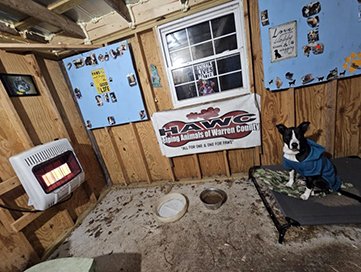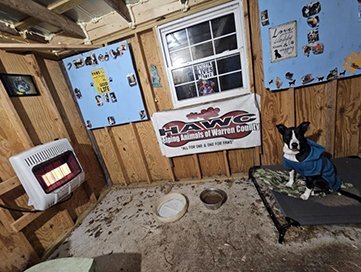Cold weather carries risks not only for people, but dogs, cats and other small animals as well.
The Animal Society for the Prevention of Cruelty to Animals (ASPCA) recommends pet owners bring animals inside if the temperatures are too cold with the adage, “If it’s too cold for you, it’s too cold for them.”
Local volunteer for McMinnville City Animal Control Hollie Cox adds pets who are housed outdoors must have adequate shelter which consists of three solid sides with an opening, roof and is raised off the ground. Igloo dog houses which are often sold in department stores are not suitable for protection from the elements as they are not insulated. Appropriate bedding, according to Cox, is straw, cedar or pine shavings rather than hay, as hay will absorb water and freeze.
To create further insulation, straw or hay bales can be used to cover the exterior of a shelter to keep heat in and cold out. The openings should face east or southeast so wintry gusts of wind do not blow directly inside.
“Animals burn more calories in cold weather, so make sure you’re feeding them more,” Cox said. “Don’t depend on blankets inside houses because, if they get wet, they will freeze like hay and some dogs like to chew on and eat the material.”
Cox also suggests taking water to outdoor animals several times a day as the water will freeze if left outside too long.
“There are a lot of homemade ideas to keep water from freezing for outside animals if you Google it, but It really is easiest to take fresh water throughout the day,” Cox said.
With nutritional and warmth needs met, the ASPCA additionally encourages pet owners to not shave animals down to the skin during the winter or bathe them more than is necessary during cold spells like the one spanning into the next week. Chemicals used to defrost ice on roadways can also be harsh on animals’ sensitive skin and paws and it is recommended to wash and dry areas that encounter pavement during walks immediately upon returning home.
Beyond keeping animals warm and free of irritants, it is discouraged to let animals roam during snow storms or inclement weather as they can become lost and dogs can sometimes struggle to find their way home.
Cox urges all pet owners to minimize how much their animals are outdoors, adding, “If at all possible, bring them inside. A bathroom or garage is better than nothing.”




